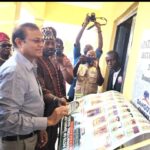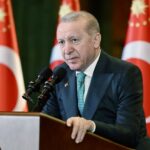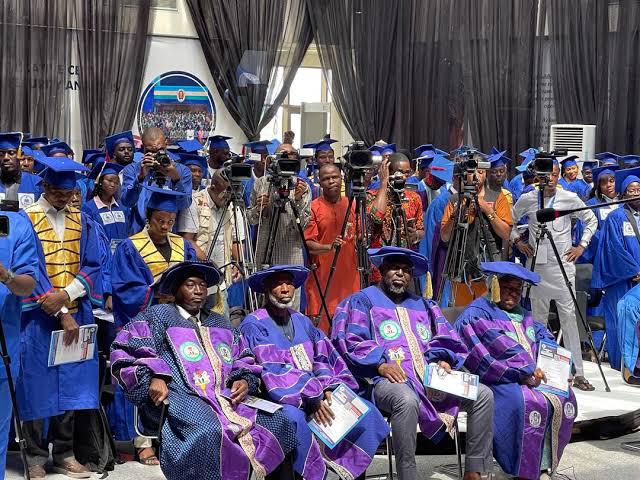By EricJames Ochigbo
Senate President, Godswill Akpabio, has tasked the State Houses of Assembly on effective oversight to ensure government funds translate into improved livelihood and job creation for citizens.
Akpabio stated at the 2025 National Institute for Legislative and Democratic Studies (NILDS)-University of Benin (UNIBEN) convocation ceremony in Abuja on Monday.
He called for continuous investment in the development of Nigeria by the citizens.
The senate president said that the 10th National Assembly, through its oversight functions, had ensured increase in revenue, which had led to increased allocations to states.
“We have no other country to call our own and so we must invest for the overall good of our country.
“As members of the 10th Senate, we will continue to do our part by strengthening existing legal frameworks and enhance our oversight responsibilities of public institutions to ensure that they deliver effective public services.
“As a matter of fact, the efforts of the 10th National Assembly in this direction have contributed immensely to increasing the revenue that accrues to the Consolidated Revenue Fund.
“Hence, it has translated into higher revenue allocation to states and the Federal Government.
“I, therefore, call on state legislatures to ensure that the increased revenue to their states translates into improved livelihood and job creation for citizens,” he said.
Akpabio urged the graduands to use the knowledge acquired to improve the quality of work and to always do their best to improve the country for the good of all.
He said that NILDS had continued to set the pace with excellent performance in research, legislative support and capacity building.
Akpabio described the convocation as another occasion that demonstrated the institute’s continued commitment to human capital and national development.
Speaker of the House of Representatives, Rep. Abbas Tajudeen, said that the reforms of the President Bola Tinubu-led administration were beginning to yield results.
Although Tajudeen noted that citizens might have different experiences to tell, it was clear that the economy was on a better growth trajectory than it would have been under a ‘business-as-usual scenario’.
“Inflation has declined below 20 per cent and the value of the naira is appreciating relative to major global currencies.
“Though it is not yet uhuru, the country is racing closer to a single-digit inflation rate and healthier exchange rate position.
“Consolidating on these gains is therefore critical.
“Just as the president has led the way with the Fiscal Policy and Tax Reforms, the 10th House of Representatives is also committed to reforming the budget process to ensure commitment to budget timelines as it applies to budget preparation, enactment, implementation, and oversight,” he said.
In a lecture, a former INEC Chairman, Prof. Attahiru Jega, said that countries practicing liberal representative or electoral democracy after a worrisome history of authoritarian military rule like Nigeria, needed constant vigilance and effort to prevent democratic regression or backsliding.
Jega stressed the need for deepening democratic development towards consolidation and sustainability.
According to him, this has become necessary given what scholars have perceived as the global crisis of democracy, characterised by ‘autocratisation.’
Jega noted that one of the most important efforts that should be made was to uplift the integrity of elections.
“This can and should be done by increasing the capacity, competence and professionalism of INEC, the Nigerian Election Management Bodies (EMB); learning from and deploying global best practices and adapting them to the Nigerian context,” he said.
The former INEC chairman stressed the importance of ensuring that electoral offenders were held to account and appropriately sanctioned, adding that there should be increase in the deployment and use of adaptable technology.
“There is no doubt that for electoral integrity to be robust and effective, the EMB needs to be adequately funded,” he said.
Earlier, the Director-General of NILDS, Prof. Abubakar Sulaiman, said that the 2025 convocation was to celebrate the graduation of 19 Higher National Diploma graduands, nine Post-Graduate Diploma and 51 Master’s degree graduands of NILDS/UNIBEN post-graduate programmes.
Sulaiman, however, called for increased funding for higher institutions in the country to enhance skills development.
“I want to use this occasion to call on the government to continue to prioritise funding for tertiary education through increased budgetary allocation.
“I urge the government to match words with action by increasing allocation to the education sector in the 2026 Appropriation Act of the Federal Government and in the Appropriation Laws of state governments in the 2026 fiscal year.
“The funding of higher institutions has a direct relationship with human capacity development. Invariably, low funding would translate to poor quality graduates.
“I want to urge the federal and state governments to find a lasting solution to the incessant ASUU strikes that have bedevilled and distorted our university education system,” he said. (NAN)(www.nannews.ng)
Edited by Yinusa Ishola/’Wale Sadeeq












